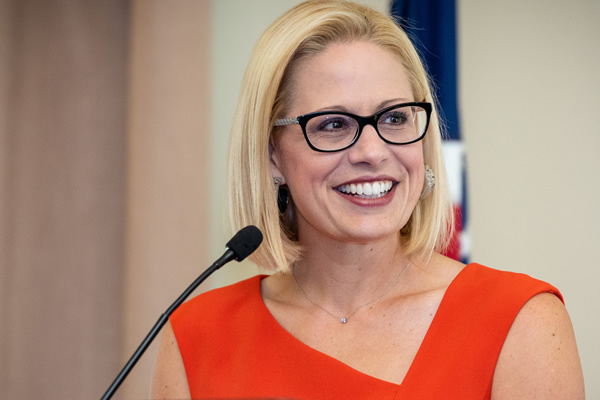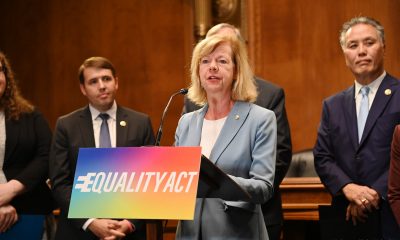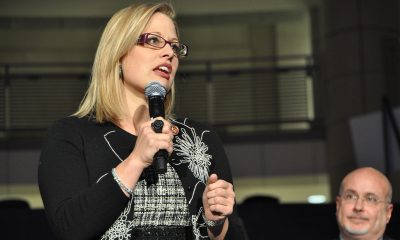News
How do you solve the Kyrsten Sinema problem?
Bisexual senator absent from WH Pride reception

Attendees of the White House reception for Pride month last week included high-profile LGBTQ leaders from activist groups, state legislatures, and the federal government. One lawmaker, however, was conspicuously absent.
Sen. Kyrsten Sinema (D-Ariz.), the only out bisexual in Congress, didn’t attend the event — an absence that stood out as members of the House LGBTQ Congressional Equality Caucus were there. Sen. Tammy Baldwin (D-Wis.), Sinema’s LGBTQ companion in the Senate, also showed up and was in the front row for President Biden’s remarks.
When the Washington Blade reached out to Sinema’s office to ask why the senator skipped the reception, her staff confirmed she had been invited.
“Kyrsten was invited, but was unable to attend as the Senate had recessed Thursday evening for state work period,” said Hannah Hurley, a Sinema spokesperson.
But the Senate recess didn’t stop Baldwin from attending the Pride reception.
It’s not the only event Sinema has skipped in recent weeks. When Vice President Kamala Harris hosted a dinner at the White House for all women members of the Senate, Sinema was the only Democrat not in attendance.
The absence of Sinema is almost metaphorical as she has become the target of ire for progressives who view her as an obstructionist to their agenda in the Senate.
Sinema, as she articulated in a recent op-ed for the Washington Post, has come out in strong defense of the filibuster in the Senate, which has been criticized as a relic of structuralism racism (although she’s not the only Senate Democrat to oppose dropping the filibuster).
“It’s no secret that I oppose eliminating the Senate’s 60-vote threshold,” Sinema writes. “I held the same view during three terms in the U.S. House, and said the same after I was elected to the Senate in 2018. If anyone expected me to reverse my position because my party now controls the Senate, they should know that my approach to legislating in Congress is the same whether in the minority or majority.”
As a result of her position, Sinema has been accused of holding up key legislation like the Equality Act, which would expand LGBTQ protections under the law. (It should be noted the bill as it stands doesn’t have unanimous support in the Democratic caucus and wouldn’t even pass without the filibuster on a majority vote.)
Also, the dramatic thumbs down she gave on the Senate floor on an amendment to raise the minimum wage to $15 an hour was interpreted as an insult to progressives pushing for the increase.
The transition for Sinema is remarkable. Starting her political career for the Arizona Legislature as a Green Party candidate who once dressed up in a tutu to oppose the Iraq war, Sinema’s latest incarnation as a conservative Democrat has some of her one-time supporters scratching their heads.
That will make things complicated for LGBTQ advocacy groups like the Human Rights Campaign and the LGBTQ Victory Fund, which have endorsed her efforts to win election, and for Democrats who sold her as the only out bisexual in Congress.
Sinema, after winning election in 2018 to a six-year term, will be in the Senate for a while and won’t face re-election until 2024. But progressives are already clamoring for LGBTQ advocacy groups to take a hard line with her regarding any future support.
Michelangelo Signorile, a progressive activist and Sinema critic, went so far in an email to the Blade as to say LGBTQ groups should withhold their endorsements entirely from Sinema.
“LGBTQ groups definitely shouldn’t be endorsing anyone blocking the Equality Act from being passed. Right now that includes every Republican and Joe Manchin and Kyrsten Sinema, who refuse to eliminate the filibuster,” Signorile said. “So of course they shouldn’t endorse her. How could the Human Rights Campaign or Victory Fund have any credibility while telling the community to invest hard-earned dollars with this politician?”
Sinema has always taken a one-foot-in, one-foot-out approach to her sexual orientation as a political figure. Accepting endorsements from LGBTQ groups, Sinema has attended events after her election hosted by them, such as an event with new LGBTQ members of Congress upon her election to the U.S. House in 2012. But Sinema has dodged questions about her bisexuality, telling the Washington Post in 2013 she doesn’t understand “why it’s big deal.”
The LGBTQ Victory Fund, for its part, is putting a degree of distance between itself and Sinema in response to inquires from the Blade, but not repudiating its support for her entirely.
Elliot Imse, a Victory Fund spokesperson, said his organization endorsed Sinema when the choice for Arizona voters was between her and “the anti-LGBTQ Republican candidate Martha McSally.”
“She is not currently endorsed by Victory Fund and we won’t be considering 2024 endorsements until summer 2023 – and much will happen between now and then,” Imse said. “As with all our incumbent candidates, the Victory Campaign Board will review her efforts to advance equality while in office as it is a key criteria for our endorsement.”
In response to an inquiry on whether the Victory Fund has reached out to Sinema about her policy positions, Imse said that would be inconsistent with his organization’s mission.
“Victory Fund has a very clear mission and we believe organizations are most successful when they remain laser-focused on that mission – so we do not take positions on specific policy or procedural questions,” Imse said. “We endorse and support LGBTQ candidates who will fight for and advance equality legislation and policies once in office and the LGBTQ members of Congress we’ve helped elect are the most outspoken and passionate voices on the Equality Act and other LGBTQ rights legislation.”
Having that “laser-focus,” however, isn’t true for other LGBTQ political groups, which do both endorsements and lobbying before Congress. Chief among them is the nation’s largest LGBTQ group, the Human Rights Campaign.
The Human Rights Campaign, however, didn’t respond to multiple requests for comment on Sinema or any discussions the organization has with her. That silence, however, likely won’t be enough for progressive activists angered with Sinema.
Signorile said Sinema’s absence from the White House should be seen as a red flag for LGBTQ advocacy groups on any future support.
“Sinema, by not attending Pride at the WH, doesn’t even make herself visible there. It’s almost like she wants to distance herself from being part of the community,” Signorile said. “She never talks about being bisexual, doesn’t discuss her coming out story — even if you ask her — and I defy anyone to find me a recent time in which she’s discussed being part of this community.”
Netherlands
Rob Jetten becomes first gay Dutch prime minister
38-year-old head of government sworn in on Monday

Rob Jetten on Monday became the Netherland’s first openly gay prime minister.
Jetten’s centrist D66 party won the country’s elections last October, narrowly defeating Geert Wilders’ far-right Party for Freedom.
King Willem-Alexander on Monday swore in Jetten, who is also the country’s youngest-ever prime minister. The Associated Press notes Jetten’s coalition government includes the center-right Christian Democrats and the center-right People’s Party for Freedom and Democracy.
“Proud to be able to do this together,” said Jetten in an X post before Willem-Alexander swore him in.
COC Nederland, a Dutch LGBTQ advocacy group, in a statement said Jetten “becoming prime minister shows that your sexual orientation doesn’t have to matter.”
“You can become a construction worker, a doctor, a lawyer, and even prime minister,” said COC Nederland.
The advocacy group noted Jetten has said his government will implement its “Rainbow Agreement” that include calls for strengthening nondiscrimination laws “to better protect transgender and intersex people,” appointing more “discrimination investigators … to address violence against LGBTQ+ people and other minorities,” and introducing measures “to promote acceptance in schools.”
“COC will hold the Cabinet to that promise,” said COC Nederland.
Jetten’s fiancé is Nicolás Keenen, an Argentine field hockey player who competed in the 2024 Summer Olympics in Paris.
Jetten is one of two openly gay heads of government: Andorran Prime Minister Xavier Espot Zamora came out in 2023. Gay Latvian President Edgars Rinkēvičs, who is the country’s head of state, took office in 2023.
Leo Varadkar, who was Ireland’s prime minister from 2017-2020 and from 2022-2024, and Xavier Bettel, who was Luxembourg’s prime minister from 2013-2023, are gay. Ana Brnabić, who was Serbia’s prime minister from 2017-2024, is a lesbian.
Former Icelandic Prime Minister Jóhanna Sigurðardóttir in 2009 became the world’s first openly lesbian head of government. Former Belgian Prime Minister Elio Di Rupo, former San Marino Captain Regent Paolo Rondelli, and former French Prime Minister Gabriel Attal are also openly gay.
Colombian presidential candidate Claudia López, who is the former mayor of Bogotá, the Colombian capital, would become her country’s first female and first lesbian president if she wins the country’s presidential election that is taking place later this year.
District of Columbia
D.C. police arrest man for burglary at gay bar Spark Social House
Suspect ID’d from images captured by Spark Social House security cameras

D.C. police on Feb. 18 arrested a 63-year-old man “of no fixed address” for allegedly stealing cash from the registers at the gay bar Spark Social House after unlawfully entering the bar at 2009 14th St., N.W., around 12:04 a.m. after it had closed for business, according to a police incident report.
“Later that day officers canvassing for the suspect located him nearby,” a separate police statement says. “63-year-old Tony Jones of no fixed address was arrested and charged with Burglary II,” the statement says.
The police incident report states that the bar’s owner, Nick Tsusaki, told police investigators that the bar’s security cameras captured the image of a man who has frequently visited the bar and was believed to be homeless.
“Once inside, the defendant was observed via the establishment’s security cameras opening the cash register, removing U.S. currency, and placing the currency into the left front pocket of his jacket,” the report says.
Tsusaki told the Washington Blade that he and Spark’s employees have allowed Jones to enter the bar many times since it opened last year to use the bathroom in a gesture of compassion knowing he was homeless. Tsusaki said he is not aware of Jones ever having purchased anything during his visits.
According to Tsusaki, Spark closed for business at around 10:30 p.m. on the night of the incident at which time an employee did not properly lock the front entrance door. He said no employees or customers were present when the security cameras show Jones entering Spark through the front door around 12:04 a.m.
Tsusaki said the security camera images show Jones had been inside Spark for about three hours on the night of the burglary and show him taking cash out of two cash registers. He took a total of $300, Tsusaki said.
When Tsusaki and Spark employees arrived at the bar later in the day and discovered the cash was missing from the registers they immediately called police, Tsusaki told the Blade. Knowing that Jones often hung out along the 2000 block of 14th Street where Spark is located, Tsusaki said he went outside to look for him and saw him across the street and pointed Jones out to police, who then placed him under arrest.
A police arrest affidavit filed in court states that at the time they arrested him police found the stolen cash inside the pocket of the jacket Jones was wearing. It says after taking him into police custody officers found a powdered substance in a Ziploc bag also in Jones’s possession that tested positive for cocaine, resulting in him being charged with cocaine possession in addition to the burglary charge.
D.C. Superior Court records show a judge ordered Jones held in preventive detention at a Feb. 19 presentment hearing. The judge then scheduled a preliminary hearing for the case on Feb. 20, the outcome of which couldn’t immediately be obtained.
District of Columbia
Judge rescinds order against activist in Capital Pride lawsuit
Darren Pasha accused of stalking organization staff, board members, volunteers

A D.C. Superior Court judge on Feb.18 agreed to rescind his earlier ruling declaring local gay activist Darren Pasha in default for failing to attend a virtual court hearing regarding an anti-stalking lawsuit brought against him by the Capital Pride Alliance, the group that organizes D.C.’s annual Pride events.
The Capital Pride lawsuit, initially filed on Oct. 27, 2025, accuses Pasha of engaging in a year-long “course of conduct” of “harassment, intimidation, threats, manipulation, and coercive behavior” targeting Capital Pride staff, board members, and volunteers.
In his own court filings without retaining an attorney, Pasha has strongly denied the stalking related allegations against him, saying “no credible or admissible evidence has been provided” to show he engaged in any wrongdoing.
Judge Robert D. Okum nevertheless on Feb. 6 approved a temporary stay-away order requiring Pasha to stay at least 100 feet away from Capital Pride’s staff, volunteers, and board members until the time of a follow-up court hearing scheduled for April 17. He reduced the stay-away distance from 200 yards as requested by Capital Pride.
In his two-page order issued on Feb. 18, Okun stated that Pasha explained that he was involved in a scooter accident in which he was injured and his phone was damaged, preventing him from joining the Feb. 6 court hearing.
“Therefore, the court finds there is a good cause for vacating the default,” Okun states in his order.
At the time he initially approved the default order at the Feb. 6 hearing that Pasha didn’t attend, Okun scheduled an April 17 ex parte proof hearing in which Capital Pride could have requested a ruling in its favor seeking a permanent anti-stalking order against Pasha.
In his Feb. 18 ruling rescinding the default order Okun changed the April 17 ex parte proof hearing to an initial scheduling conference hearing in which a decision on the outcome of the case is not likely to happen.
In addition, he agreed to consider Pasha’s call for a jury trial and gave Capital Pride 14 days to contest that request. The Capital Pride lawsuit initially called for a non-jury trial by judge.
One request by Pasha that Okum denied was a call for him to order Capital Pride to stop its staff or volunteers from posting information about the lawsuit on social media. Pasha has said the D.C.-based online blog called DC Homos, which Pasha claims is operated by someone associated with Capital Pride, has been posting articles portraying him in a negative light and subjecting him to highly negative publicity.
“The defendant has not set forth a sufficient basis for the court to restrict the plaintiff’s social media postings, and the court therefore will deny the defendant’s request in his social media praecipe,” Okun states in his order.
A praecipe is a formal written document requesting action by a court.
Pasha called the order a positive development in his favor. He said he plans to file another motion with more information about what he calls the unfair and defamatory reports about him related to the lawsuit by DC Homos, with a call for the judge to reverse his decision not to order Capital Pride to stop social media postings about the lawsuit.
Pasha points to a video interview on the LGBTQ Team Rayceen broadcast, a link to which he sent to the Washington Blade, in which DC Homos operator Jose Romero acknowledged his association with Capital Pride Alliance.
Capital Pride Executive Director Ryan Bos didn’t immediately respond to a message from the Blade asking whether Romero was a volunteer or employee with Capital Pride.
Pasha also said he believes the latest order has the effect of rescinding the temporary stay away order against him approved by Okun in his earlier ruling, even though Okun makes no mention of the stay away order in his latest ruling. Capital Pride attorney Nick Harrison told the Blade the stay away order “remains in full force and effect.”
Harrison said Capital Pride has no further comment on the lawsuit.




















